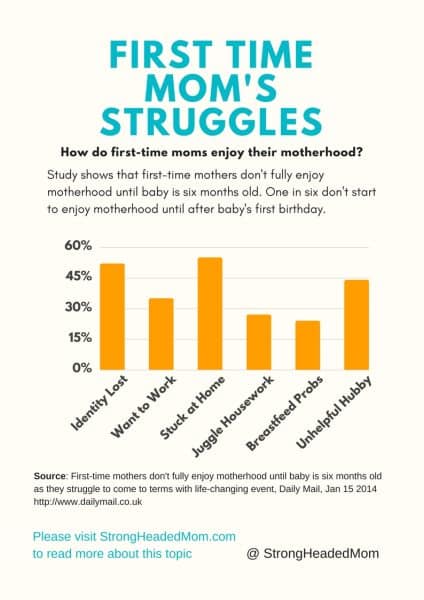Being a first-time mom can be both an exciting and challenging experience. As you embark on this new journey, you may wonder about the everyday struggles many first-time moms face. From sleepless nights to breastfeeding difficulties, navigating through the world of motherhood can bring about various obstacles.
This article will explore some of the most common challenges first-time moms encounter and provide helpful tips to overcome them. So, if you’re a first-time mom seeking guidance and reassurance, read on to discover more about what lies ahead and how to conquer the hurdles that may come your way.
Review contents
1. Physical Changes
1.1 Weight Gain
As a first-time mom, one of the physical changes you are likely to experience is weight gain. During pregnancy, your body naturally gains weight to support the growth and development of your baby. However, this weight gain can sometimes feel overwhelming, mainly if you are used to maintaining a certain weight or body shape. It’s important to remember that weight gain is a normal part of pregnancy and is necessary for a healthy pregnancy. Embrace your changing body and focus on the incredible journey you are going through.
1.2 Fatigue
Another physical change that many first-time moms struggle with is fatigue. Growing a baby is a demanding process that requires a lot of energy from your body. As your baby develops, your body works hard to provide nutrients and support.
This can leave you feeling exhausted and drained. It’s essential to listen to your body and prioritize rest and self-care during this time. Don’t be afraid to ask for help and take breaks when needed. Remember, you are growing a human being, and it’s completely normal to feel tired.
1.3 Nausea and Morning Sickness
Nausea and morning sickness are common physical challenges that many first-time moms face during their pregnancy. These symptoms can range from mild nausea to persistent vomiting and can occur at any time of the day or night. While the exact cause of morning sickness is not fully understood, hormonal changes are believed to play a significant role.
Although it can be challenging to cope with the discomfort, some strategies may help alleviate these symptoms. Eating small, frequent meals, avoiding trigger foods, staying hydrated, and getting plenty of rest can all contribute to managing nausea and morning sickness.
1.4 Breast Changes
During pregnancy, your breasts undergo significant changes in preparation for breastfeeding. These changes can include increased breast size, tenderness, and darkening of the areolas. These physical changes can sometimes be uncomfortable or even painful. Wearing a supportive bra and using warm or cold compresses can provide relief. It’s important to remember that these changes are natural and necessary for nourishing your baby. Embrace these changes as a beautiful part of your journey into motherhood.
2. Emotional Challenges
2.1 Hormonal Changes
As a first-time mom, you may be surprised by the intense emotional roller coaster that pregnancy and early motherhood can bring. Hormonal changes, such as fluctuations in estrogen and progesterone levels, can significantly impact your mood and emotions.
It’s essential to recognize that these changes are regular and to be gentle with yourself during this time. Communicate your feelings with your partner, friends, or family members who can offer support and understanding.
2.2 Mood Swings
Mood swings are another common emotional challenge that many first-time moms experience. One minute, you may feel satisfied and excited; the next, you may be in tears or overwhelmed. These mood swings can be attributed to hormonal changes, physical discomforts, and the anticipation of becoming a mother.
Acknowledging and accepting these mood swings as a normal part of the journey is essential. Finding healthy coping methods, such as calming activities like yoga or meditation, can help stabilize your emotions.
2.3 Anxiety and Fear
Feeling anxious or fearful during pregnancy and early motherhood is entirely normal. You may worry about your baby’s health and well-being or the challenges ahead. It’s important to remember that you are not alone in these feelings and that seeking support can make a significant difference.
Contact your healthcare provider or join a support group to connect with other first-time moms experiencing similar fears and anxieties. Remember to take deep breaths, practice self-care, and remind yourself that you are doing your best.
2.4 Postpartum Depression
Postpartum depression is a severe and common emotional challenge some first-time moms may experience after giving birth. It is characterized by persistent sadness, fatigue, irritability, difficulty bonding with your baby, and changes in appetite and sleep patterns.
If you suspect you may be experiencing postpartum depression, seeking help from a healthcare provider as soon as possible is crucial. Remember that postpartum depression is a medical condition, not a reflection of your abilities as a mother. You can overcome it and thrive as a mother with the proper support and treatment.
3. Lifestyle Adjustments
3.1 Lack of Sleep
One of first-time moms’ most significant lifestyle adjustments is the lack of sleep. Newborns have sleep patterns that do not align with the typical eight-hour sleep cycle. You may wake up multiple times during the night to feed and care for your baby. This can leave you feeling exhausted and sleep-deprived. It’s important to prioritize sleep whenever possible. Nap when your baby naps, ask for help from your partner or family members, and try to establish a bedtime routine that promotes relaxation.
3.2 Time Management
With the arrival of a baby, time management becomes a critical skill for first-time moms. Balancing your baby’s needs, household chores, and personal responsibilities can feel overwhelming. It’s essential to set realistic expectations for yourself and remember that it’s okay to ask for help. Creating a schedule and prioritizing tasks can help you manage your time more effectively. Remember to carve out time for self-care and activities that bring you joy.
3.3 Social Life
As a new mom, your social life may undergo significant changes. Maintaining the same level of social engagement and spontaneous outings you were accustomed to before becoming a mom can be challenging. However, staying connected with friends and finding support within your social circle is important. Consider joining mom groups or online communities where you can connect with other moms who are going through similar experiences. It’s essential to surround yourself with a supportive network of friends who understand and empathize with the challenges of motherhood.
3.4 Financial Constraints
Becoming a parent often brings financial challenges for first-time moms. The cost of baby essentials, healthcare expenses, and potential loss of income during maternity leave can strain your finances. It’s essential to create a budget and plan for the financial responsibilities of raising a child. Look for ways to save money, such as buying second-hand baby items or seeking community resources. Additionally, consider talking to a financial advisor who can guide you in managing your finances during this transition.
4. Relationship Changes
4.1 Marital Issues
A baby’s arrival can significantly change your relationship with your partner. The added responsibilities and sleepless nights can sometimes increase stress and tension. Communicating openly and honestly with your partner about your needs, fears, and frustrations is essential. Make an effort to spend quality time together, even just a few minutes each day. Remember that your relationship is the foundation of your family, and nurturing it is critical to navigating the challenges of parenthood.
4.2 Communication Problems
Miscommunication and misunderstandings are common challenges many first-time moms face in their relationships. The exhaustion and overwhelm of caring for a newborn can make it difficult to express yourself clearly or to find the time for meaningful conversations with your partner. Consider setting aside dedicated time each day to check in with each other and discuss any concerns or issues that may arise. Remember to be patient and understanding with each other as you both navigate the joys and challenges of parenthood.
4.3 Division of Responsibilities
The division of responsibilities within your household is another common relationship challenge for first-time moms. It’s essential to have open and ongoing discussions with your partner about how household tasks, childcare, and work responsibilities will be divided. Consider creating a shared calendar or task list to ensure both partners are aware of and accountable for their responsibilities. Flexibility and mutual support are crucial to finding a balance that works for both of you.
4.4 Lack of Intimacy
The demands of early motherhood can also impact intimacy. The physical and emotional changes you experience, exhaustion, and stress can sometimes lead to decreased sexual desire or discomfort during sexual activity. It’s essential to have open and honest conversations with your partner about your needs and concerns. Exploring new ways to connect and express intimacy, such as through non-sexual physical touch, emotional support, or simply spending quality time together, can help maintain the bond between you and your partner.
5. Breastfeeding Challenges
5.1 Establishing Milk Supply
Breastfeeding can be a rewarding experience but can also come with challenges. Many first-time moms struggle with establishing a sufficient milk supply in the early days or weeks after giving birth. It’s essential to stay hydrated, eat a well-balanced diet, and seek support from a lactation consultant or breastfeeding support group. They can guide proper latch techniques, positioning, and supply-boosting strategies. Remember that every breastfeeding journey is unique, and it’s essential to be patient and kind to yourself as you and your baby navigate this new skill together.
5.2 Engorgement and Pain
Engorgement and breast pain are common breastfeeding challenges that many first-time moms may face. As your milk supply increases, your breasts may become swollen, tender, and painful. It’s important to nurse frequently and empty your breasts to alleviate discomfort. Applying warm compresses or a warm shower before nursing can help promote milk flow and provide relief. If you continue to experience severe pain or engorgement, contact a healthcare professional for guidance.
5.3 Latching Difficulties
Proper latching is essential for successful breastfeeding. However, many first-time moms may encounter difficulties getting their baby to latch. It’s essential to seek support from a lactation consultant or breastfeeding support group who can provide hands-on guidance and tips for improving latch. They can also help identify any underlying issues, such as tongue-tie, that may impact your baby’s ability to latch correctly. Patience and practice are vital to establishing a comfortable and practical latch.
5.4 Dealing with Nursing Discomforts
Breastfeeding can sometimes be accompanied by discomforts such as sore nipples, breast infections, or thrush. Sore nipples can be treated with lanolin cream or nipple shields. If you suspect a breast infection or thrush, it’s essential to seek medical advice and treatment as soon as possible. Remember to take care of yourself and prioritize your comfort during this time. Nursing should not be painful; seeking support from a lactation consultant can help address any challenges or discomfort you may be experiencing.
6. Sleep Deprivation
6.1 Adjusting to Newborn Sleep Patterns
One of the most challenging aspects of early motherhood is adjusting to your newborn’s sleep patterns. Newborns have shorter sleep cycles and may wake frequently during the night for feeding and comfort. This can leave you feeling exhausted and sleep-deprived. It’s important to remember that this phase is temporary and that your baby’s sleep patterns will gradually evolve. In the meantime, try to establish a bedtime routine, create a calm sleep environment, and enlist the help of your partner or support system to share nighttime responsibilities.
6.2 Trouble Falling Asleep
Many first-time moms struggle with falling asleep, even when they have the opportunity to rest. The combination of physical discomfort, hormonal changes, and a busy mind can make it difficult to relax and fall asleep. Establishing a soothing bedtime routine, such as taking a warm bath or practicing relaxation techniques, can help signal to your body and mind that it’s time to sleep. Avoiding stimulating activities or screens before bed and creating a calm sleep environment can also aid in promoting restful sleep.
6.3 Waking Up Frequently at Night
Waking up frequently during the night to care for your baby is a common experience for first-time moms. This constant interruption of sleep can leave you feeling exhausted and irritable. It’s essential to find strategies that help you fall back asleep quickly after nighttime awakenings. Keep your bedroom dark and quiet, limit the amount of time spent awake during nighttime feedings or diaper changes, and consider using white noise or relaxation techniques to promote relaxation and sleep.
6.4 Lack of Quality Rest
While a lack of quantity of sleep is a common challenge for first-time moms, the quality of your rest is also crucial. Even if you get a few hours of sleep here and there, a restless or interrupted sleep can leave you feeling groggy and tired. Create a sleep-friendly environment by keeping your bedroom cool, dark, and quiet. Consider investing in comfortable mattresses, pillows, and bedding to promote better sleep. Establishing a consistent sleep routine and practicing relaxation techniques can also help improve the quality of your rest.
7. Self-Identity and Body Image
7.1 Loss of Independence
Becoming a first-time mom can sometimes bring a sense of loss of independence. The demands of caring for a newborn may leave you with less time and energy for your pursuits and interests. Finding ways to maintain a sense of self and prioritize self-care is essential. Carve out time for activities that bring you joy and fulfillment, whether engaging in a hobby, exercising, or simply taking a quiet moment for yourself. Remember that caring for yourself is not selfish but necessary for your well-being.
7.2 Body Changes and Self-Esteem
The physical changes that come with pregnancy and motherhood can sometimes impact your self-esteem and body image. It’s important to remember that your body has gone through an incredible transformation to bring life into the world. Embrace your body’s journey and celebrate the strength and resilience it possesses. Surround yourself with positive influences, practice self-love and self-care, and wear clothes that make you feel comfortable and confident. Building a healthy body image takes time, but you can learn to love and appreciate your postpartum body with patience and self-compassion.
7.3 Balancing Motherhood with Personal Identity
Balancing your new role as a mother with your identity and interests is an ongoing challenge for many first-time moms. It’s essential to balance your responsibilities as a mother and the activities and passions that make you who you are. Prioritize self-care, communicate your needs with your support system, and explore ways to integrate your identity into your daily life as a mom. Remember that being a mother doesn’t mean giving up who you were before but instead incorporating that identity into motherhood’s beautiful and multifaceted role.
7.4 Dealing with Societal Pressure
As a first-time mom, you may feel pressured to adhere to societal expectations and the perceived “perfect mother” image. It’s important to remember that there is no one-size-fits-all approach to motherhood. Each mother and baby is unique, and what works for one may not work for another. Trust your instincts, seek support and guidance from reliable sources, and remember you are doing your best. Surround yourself with a supportive community that uplifts and encourages you rather than adds to the pressure. Let go of comparisons and embrace your unique journey as a first-time mom.
8. Parenting Decisions
8.1 Decision Overload
As a first-time mom, you may find yourself overwhelmed by the sheer number of decisions that need to be made regarding your baby’s care. From choosing the right products to navigating healthcare options, it can be challenging to navigate this new territory. It’s important to remember that there is no one “right” way to parent. Trust your instincts, gather information from reputable sources, and surround yourself with a support network of experienced parents or healthcare providers who can offer guidance and reassurance. Take it one decision at a time, and remember that you are the expert on your child.
8.2 Choosing the Right Childcare Option
Choosing the right childcare option is a significant decision many first-time moms face as they prepare to return to work or pursue other commitments. Whether you opt for daycare, a nanny, or family care, it’s essential to research and consider your options carefully. Seek recommendations from trusted sources, visit potential childcare facilities, and ask questions to ensure a safe and nurturing environment for your child. Trust your instincts and choose an option that aligns with your values and provides peace of mind.
8.3 Selecting a Pediatrician
Finding the right pediatrician for your baby is an important decision that can significantly impact your child’s health and well-being. Take the time to research and interview potential pediatricians, considering their approach to healthcare, availability, and compatibility with your family’s values and beliefs. Seek recommendations from friends, family, or your healthcare provider. Remember that you have the right to ask questions and advocate for your child’s needs. Choosing a pediatrician who aligns with your parenting style and values can provide reassurance and support as you navigate the early years of your child’s life.
8.4 Balancing Work and Parenting
Balancing work and parenting is a common challenge that first-time moms face. The demands of both roles can sometimes feel overwhelming and leave you feeling pulled in different directions. It’s important to communicate openly and honestly with your employer about your needs and explore flexible work arrangements if possible. Create a support system that can assist with childcare or household responsibilities, and establish boundaries to ensure dedicated time for both work and family. Remember that finding a balance is a process, and it’s okay to reevaluate and adjust as your circumstances and needs change.
9. Lack of Support
9.1 Absence of Spouse or Partner
The absence of a spouse or partner during pregnancy and early motherhood can present unique challenges for first-time moms. It’s essential to seek support from family members, friends, or community resources who can lend a helping hand. Consider joining mom groups or online communities to connect with other single moms experiencing similar challenges. Contact healthcare providers or social services for additional support and guidance. Remember that you are not alone; resources are available to help you navigate this journey as a single mom.
9.2 Limited or No Family Support
Limited or no family support can be a significant challenge for first-time moms. The absence of extended family members who can offer guidance, assistance, or emotional support can leave you feeling isolated. It’s essential to seek other forms of support, such as joining parenting groups or connecting with other moms in your community. Many areas offer resources and programs for new moms, such as postpartum support groups or home visiting programs. Contact healthcare providers or community organizations for information on available resources in your area.
9.3 Lack of Friends with Similar Experiences
Feeling like you lack friends with similar experiences can be isolating and make the challenges of early motherhood feel even more overwhelming. It’s essential to seek opportunities to connect with other moms going through similar experiences. Joining mom groups, attending parenting classes or workshops, or participating in online communities can provide a sense of camaraderie and support. Remember that motherhood is a shared experience; connecting with others who can relate to your joys and challenges can make a significant difference in your well-being.
9.4 Challenges in Finding Reliable Help
Finding reliable help to support you during pregnancy and early motherhood can be challenging for first-time moms. Whether it’s finding a trusted babysitter, a reliable house cleaner, or someone to assist with household tasks, it’s essential to establish a support network that you can rely on. Seek recommendations from trusted sources, conduct interviews or trial periods to ensure compatibility, and trust your instincts when choosing individuals to help you. Remember that asking for help is not a sign of weakness but rather a necessary part of self-care and managing the demands of early motherhood.
10. Adjusting to New Role
10.1 Fear of Failure
Adjusting to your new role as a mother can sometimes come with a fear of failure. You may worry about making mistakes, being unable to meet your baby’s needs, or feeling overwhelmed by the responsibilities of parenthood. It’s important to remember that no one is a perfect parent, and every parent makes mistakes along the way. Trust in your abilities and seek support when needed. Surround yourself with positive influences and remind yourself that you are doing your best for your baby.
10.2 Self-Doubt and Insecurity
Self-doubt and insecurity are common feelings that many first-time moms experience. You may question your abilities, compare yourself to other moms, or feel unsure about your decisions. It’s important to remember that you are the expert regarding your child. Trust your instincts, seek information from reliable sources, and surround yourself with a supportive network of friends, family, or healthcare providers who can offer guidance and reassurance. Focus on the love and care you provide for your baby, and remember that parenting is a journey of learning and growth.
10.3 Understanding Parental Responsibilities
Understanding your new parental responsibilities can feel overwhelming and daunting as a first-time mom. From feeding and diapering to comforting and nurturing, there is a steep learning curve when caring for a newborn. It’s essential to seek information and guidance from reputable sources, such as healthcare providers, parenting books, or websites. Reach out to experienced parents in your life for advice and support. Remember that no one expects you to have all the answers, and it’s okay to ask questions and seek help when needed.
10.4 Finding a New Sense of Purpose
Becoming a mother brings your life a new sense of purpose and meaning. However, discovering and embracing this new purpose can take time and adjustment. It’s essential to allow yourself grace and patience as you navigate this new role. Permit yourself to let go of your old identity and embrace the transformative journey of motherhood. Reflect on the joy and fulfillment of nurturing and raising a child. Embrace the challenges and growth opportunities motherhood brings, and trust that you are on a path of continuous discovery and personal growth.



































